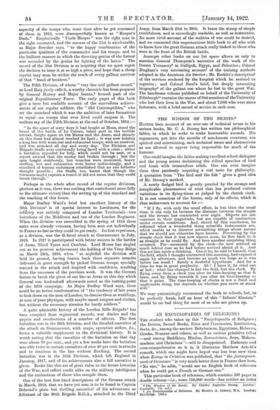THE WISDOM OF Mt, BEASTS.* HAVING been accused of an
over-use of technical terms in his serious books, Mr. C. A. Strong has written ten philosophical fables, in which he seeks to make honourable amends. His arguments, put into the mouths of non-human creatures, are spirited and entertaining, such technical terms and abstractions as are allowed to appear being responsible for much of the humour.
One could imagine the fables making excellent school dialogues and the young actors declaiming the stilted speeches of bird and beast with tremendous relish. One can even imagine them thus painlessly acquiring a real taste for philosophy. A quotation from "'The bird and the fish " gives a good idea of Mr. Strong's method.
A newly fledged bird is greatly puzzled by the strange and inexplicable phenomenon of wind that has produced curious variations in its flying-times as judged by the church clock. It is not conscious of the breeze, only of its effects, which it thus endeavours to account for :-
" If I fly, with only the usual effort, in less than the usual time, it can only be because the distance between the steeple and the stream has contracted over night. Objects are not constant in their magnitude but are capable of contraction under certain conditions. And, elated by this conclusion, he reflected what a wonderful thing scientific instruments are, which enable us to discover astonishing things about nature that we should not otherwise have known. Perceiving by the steeple clock that it was now almost noon, he flew back to it as straight as he could fly. And here another surprising thing occurred. For—measured by the clock—he now arrived as much behind time as he had before arrived ahead of it. And this set him again a-thinking. Can it be, he said to himself, that the field, which I thought contracted this morning, had expanded again by afternoon, and become as much too large as it was before too small ? Surely a doubtful hypothesis. And for a time he was in great perplexity. Ah ! I have it, he cried out at last ; what has changed is not the field, but the clock. By flying away from a clock you alter its time-keeping -so that it loses, and by flying towards it you alter its time-keeping so that it gains. The time-keeping of clocks is not a fixed and unalterable thing, but depends on whether you move or stand still."
We may patronizingly recommend the book to schools, but, to be perfectly frank, half an hour of this " Infants' Einstein"
would be no bad thing for most of us who are grown up.


































 Previous page
Previous page